Taxation Law Assignment: TLAW603, Taxation Law, Semester 2, 2019
VerifiedAdded on 2022/10/13
|12
|2800
|21
Homework Assignment
AI Summary
This document presents a comprehensive solution to a taxation law assignment, likely for a university-level course (TLAW603), focusing on Australian taxation principles. The solution meticulously calculates income tax liabilities for two individuals, Piper and David, detailing assessable income, allowable deductions, and tax payable, referencing relevant sections of the ITAA 1936 and ITAA 1997. It addresses specific scenarios, such as foreign-sourced income, self-education expenses, and the tax implications of various income sources like salaries and gifts. The assignment further explores superannuation, discussing the tax treatment of foreign super funds and offering strategies like re-contribution to minimize tax liabilities. It concludes by examining deductible expenses related to seminars and self-education, providing a complete and practical guide to navigating complex tax scenarios.
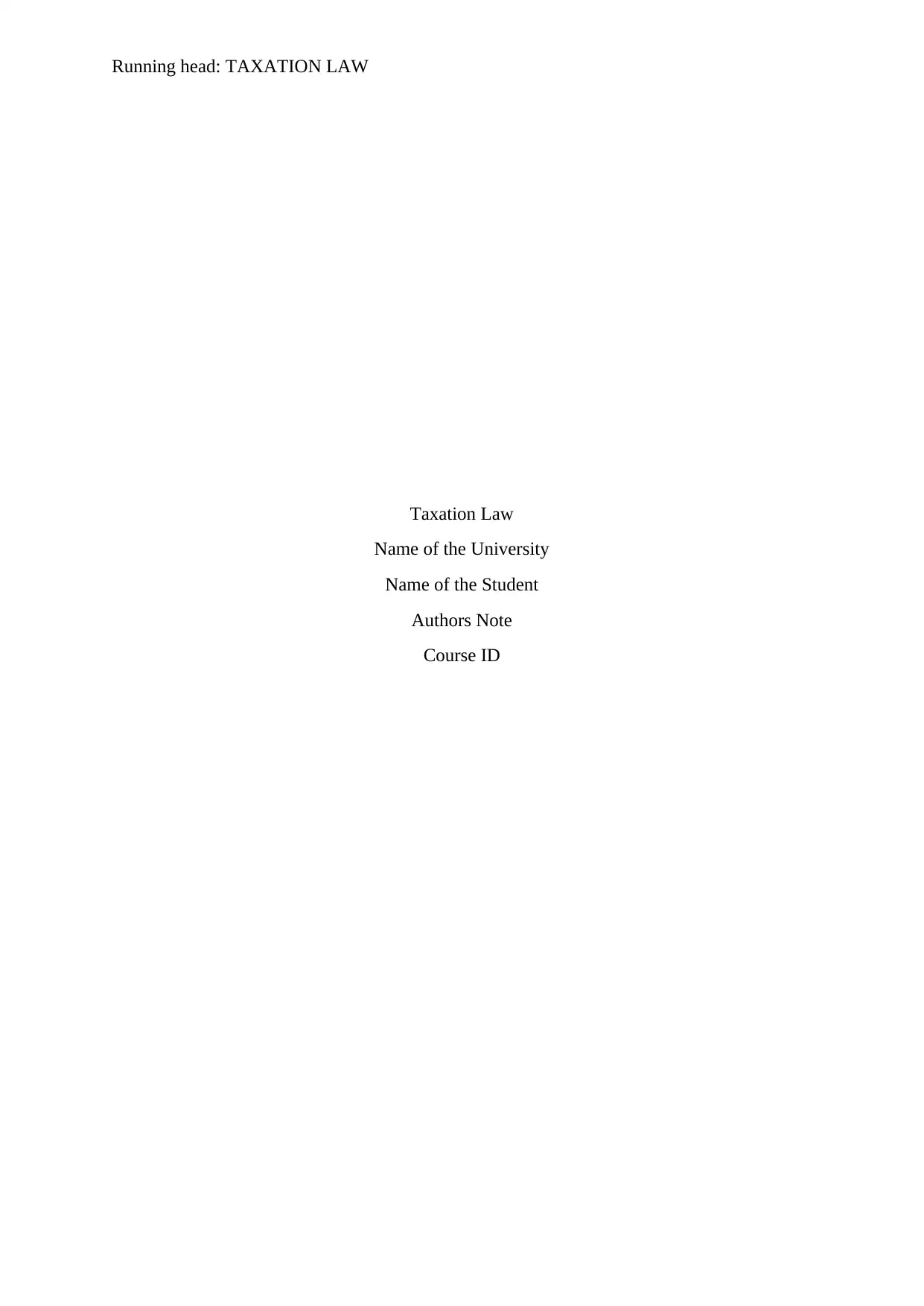
Running head: TAXATION LAW
Taxation Law
Name of the University
Name of the Student
Authors Note
Course ID
Taxation Law
Name of the University
Name of the Student
Authors Note
Course ID
Paraphrase This Document
Need a fresh take? Get an instant paraphrase of this document with our AI Paraphraser
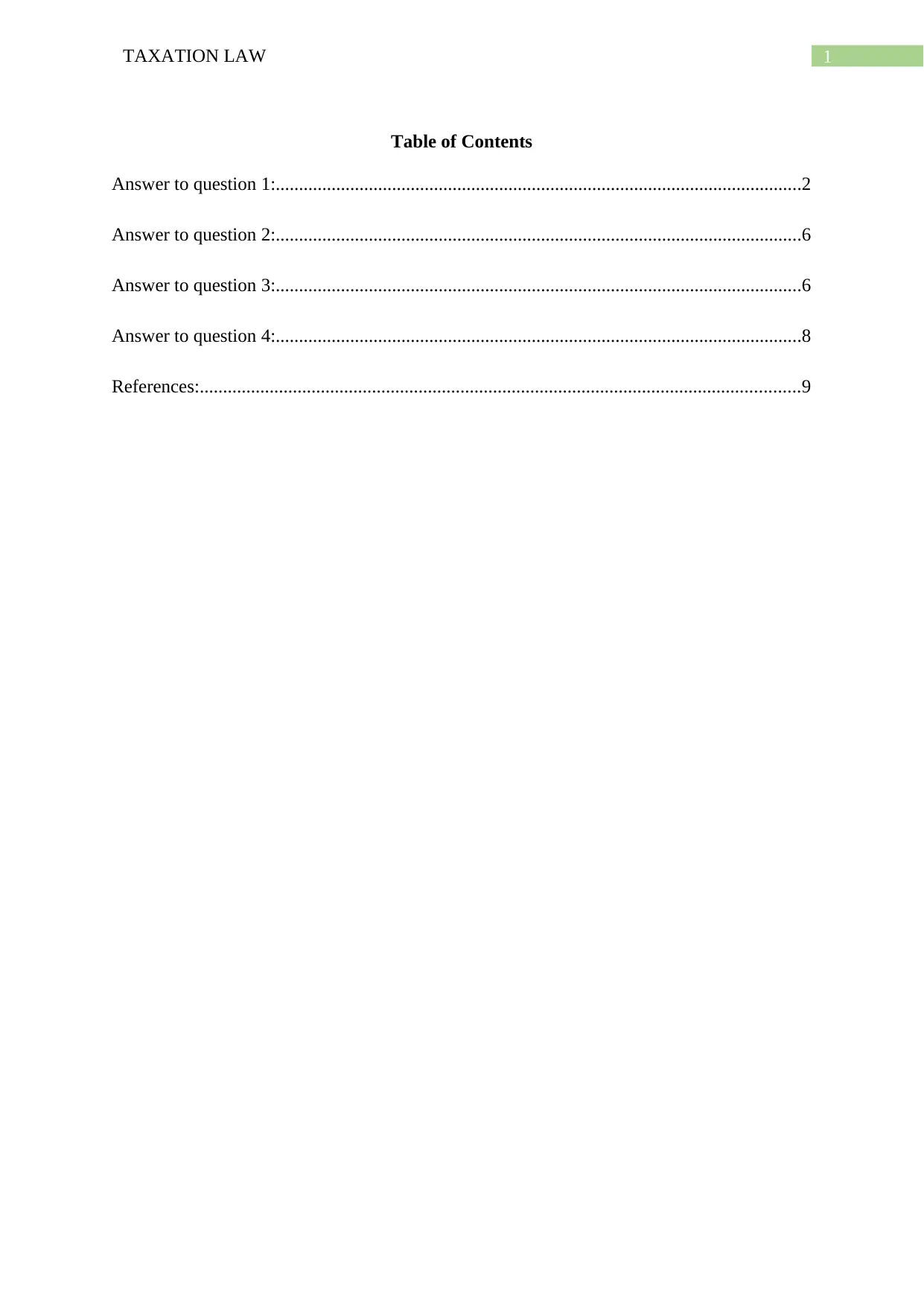
1TAXATION LAW
Table of Contents
Answer to question 1:.................................................................................................................2
Answer to question 2:.................................................................................................................6
Answer to question 3:.................................................................................................................6
Answer to question 4:.................................................................................................................8
References:.................................................................................................................................9
Table of Contents
Answer to question 1:.................................................................................................................2
Answer to question 2:.................................................................................................................6
Answer to question 3:.................................................................................................................6
Answer to question 4:.................................................................................................................8
References:.................................................................................................................................9
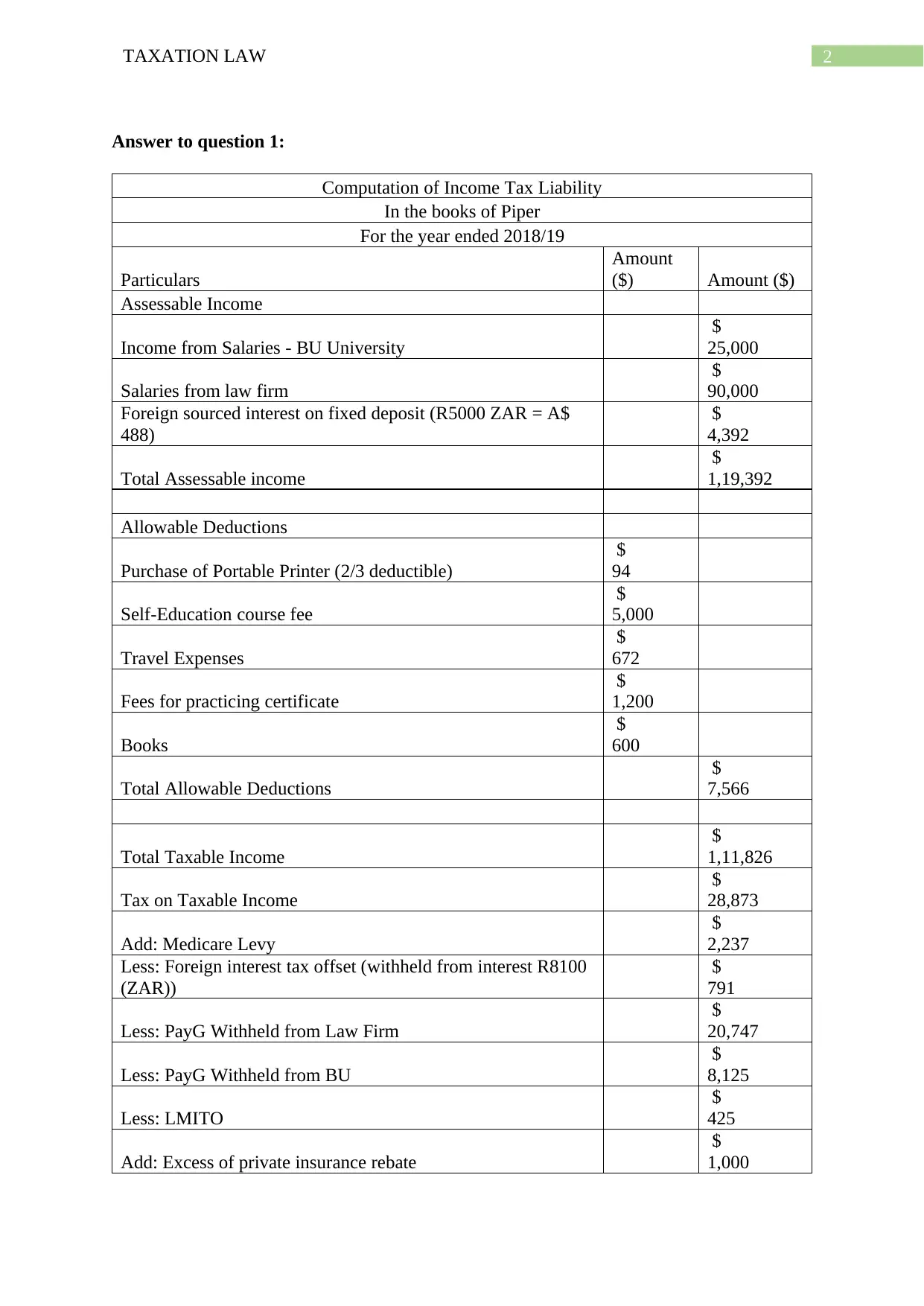
2TAXATION LAW
Answer to question 1:
Computation of Income Tax Liability
In the books of Piper
For the year ended 2018/19
Particulars
Amount
($) Amount ($)
Assessable Income
Income from Salaries - BU University
$
25,000
Salaries from law firm
$
90,000
Foreign sourced interest on fixed deposit (R5000 ZAR = A$
488)
$
4,392
Total Assessable income
$
1,19,392
Allowable Deductions
Purchase of Portable Printer (2/3 deductible)
$
94
Self-Education course fee
$
5,000
Travel Expenses
$
672
Fees for practicing certificate
$
1,200
Books
$
600
Total Allowable Deductions
$
7,566
Total Taxable Income
$
1,11,826
Tax on Taxable Income
$
28,873
Add: Medicare Levy
$
2,237
Less: Foreign interest tax offset (withheld from interest R8100
(ZAR))
$
791
Less: PayG Withheld from Law Firm
$
20,747
Less: PayG Withheld from BU
$
8,125
Less: LMITO
$
425
Add: Excess of private insurance rebate
$
1,000
Answer to question 1:
Computation of Income Tax Liability
In the books of Piper
For the year ended 2018/19
Particulars
Amount
($) Amount ($)
Assessable Income
Income from Salaries - BU University
$
25,000
Salaries from law firm
$
90,000
Foreign sourced interest on fixed deposit (R5000 ZAR = A$
488)
$
4,392
Total Assessable income
$
1,19,392
Allowable Deductions
Purchase of Portable Printer (2/3 deductible)
$
94
Self-Education course fee
$
5,000
Travel Expenses
$
672
Fees for practicing certificate
$
1,200
Books
$
600
Total Allowable Deductions
$
7,566
Total Taxable Income
$
1,11,826
Tax on Taxable Income
$
28,873
Add: Medicare Levy
$
2,237
Less: Foreign interest tax offset (withheld from interest R8100
(ZAR))
$
791
Less: PayG Withheld from Law Firm
$
20,747
Less: PayG Withheld from BU
$
8,125
Less: LMITO
$
425
Add: Excess of private insurance rebate
$
1,000
⊘ This is a preview!⊘
Do you want full access?
Subscribe today to unlock all pages.

Trusted by 1+ million students worldwide
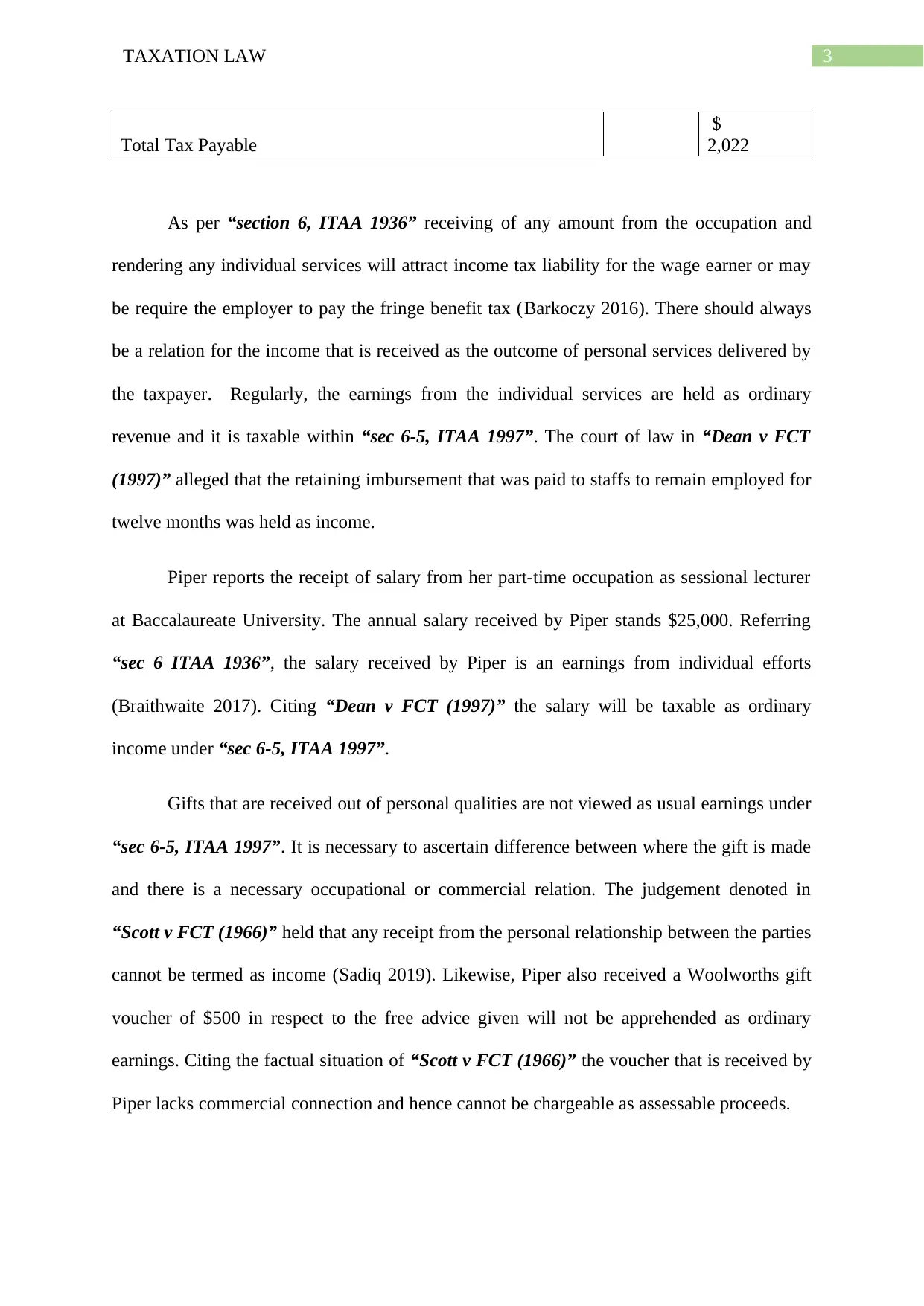
3TAXATION LAW
Total Tax Payable
$
2,022
As per “section 6, ITAA 1936” receiving of any amount from the occupation and
rendering any individual services will attract income tax liability for the wage earner or may
be require the employer to pay the fringe benefit tax (Barkoczy 2016). There should always
be a relation for the income that is received as the outcome of personal services delivered by
the taxpayer. Regularly, the earnings from the individual services are held as ordinary
revenue and it is taxable within “sec 6-5, ITAA 1997”. The court of law in “Dean v FCT
(1997)” alleged that the retaining imbursement that was paid to staffs to remain employed for
twelve months was held as income.
Piper reports the receipt of salary from her part-time occupation as sessional lecturer
at Baccalaureate University. The annual salary received by Piper stands $25,000. Referring
“sec 6 ITAA 1936”, the salary received by Piper is an earnings from individual efforts
(Braithwaite 2017). Citing “Dean v FCT (1997)” the salary will be taxable as ordinary
income under “sec 6-5, ITAA 1997”.
Gifts that are received out of personal qualities are not viewed as usual earnings under
“sec 6-5, ITAA 1997”. It is necessary to ascertain difference between where the gift is made
and there is a necessary occupational or commercial relation. The judgement denoted in
“Scott v FCT (1966)” held that any receipt from the personal relationship between the parties
cannot be termed as income (Sadiq 2019). Likewise, Piper also received a Woolworths gift
voucher of $500 in respect to the free advice given will not be apprehended as ordinary
earnings. Citing the factual situation of “Scott v FCT (1966)” the voucher that is received by
Piper lacks commercial connection and hence cannot be chargeable as assessable proceeds.
Total Tax Payable
$
2,022
As per “section 6, ITAA 1936” receiving of any amount from the occupation and
rendering any individual services will attract income tax liability for the wage earner or may
be require the employer to pay the fringe benefit tax (Barkoczy 2016). There should always
be a relation for the income that is received as the outcome of personal services delivered by
the taxpayer. Regularly, the earnings from the individual services are held as ordinary
revenue and it is taxable within “sec 6-5, ITAA 1997”. The court of law in “Dean v FCT
(1997)” alleged that the retaining imbursement that was paid to staffs to remain employed for
twelve months was held as income.
Piper reports the receipt of salary from her part-time occupation as sessional lecturer
at Baccalaureate University. The annual salary received by Piper stands $25,000. Referring
“sec 6 ITAA 1936”, the salary received by Piper is an earnings from individual efforts
(Braithwaite 2017). Citing “Dean v FCT (1997)” the salary will be taxable as ordinary
income under “sec 6-5, ITAA 1997”.
Gifts that are received out of personal qualities are not viewed as usual earnings under
“sec 6-5, ITAA 1997”. It is necessary to ascertain difference between where the gift is made
and there is a necessary occupational or commercial relation. The judgement denoted in
“Scott v FCT (1966)” held that any receipt from the personal relationship between the parties
cannot be termed as income (Sadiq 2019). Likewise, Piper also received a Woolworths gift
voucher of $500 in respect to the free advice given will not be apprehended as ordinary
earnings. Citing the factual situation of “Scott v FCT (1966)” the voucher that is received by
Piper lacks commercial connection and hence cannot be chargeable as assessable proceeds.
Paraphrase This Document
Need a fresh take? Get an instant paraphrase of this document with our AI Paraphraser
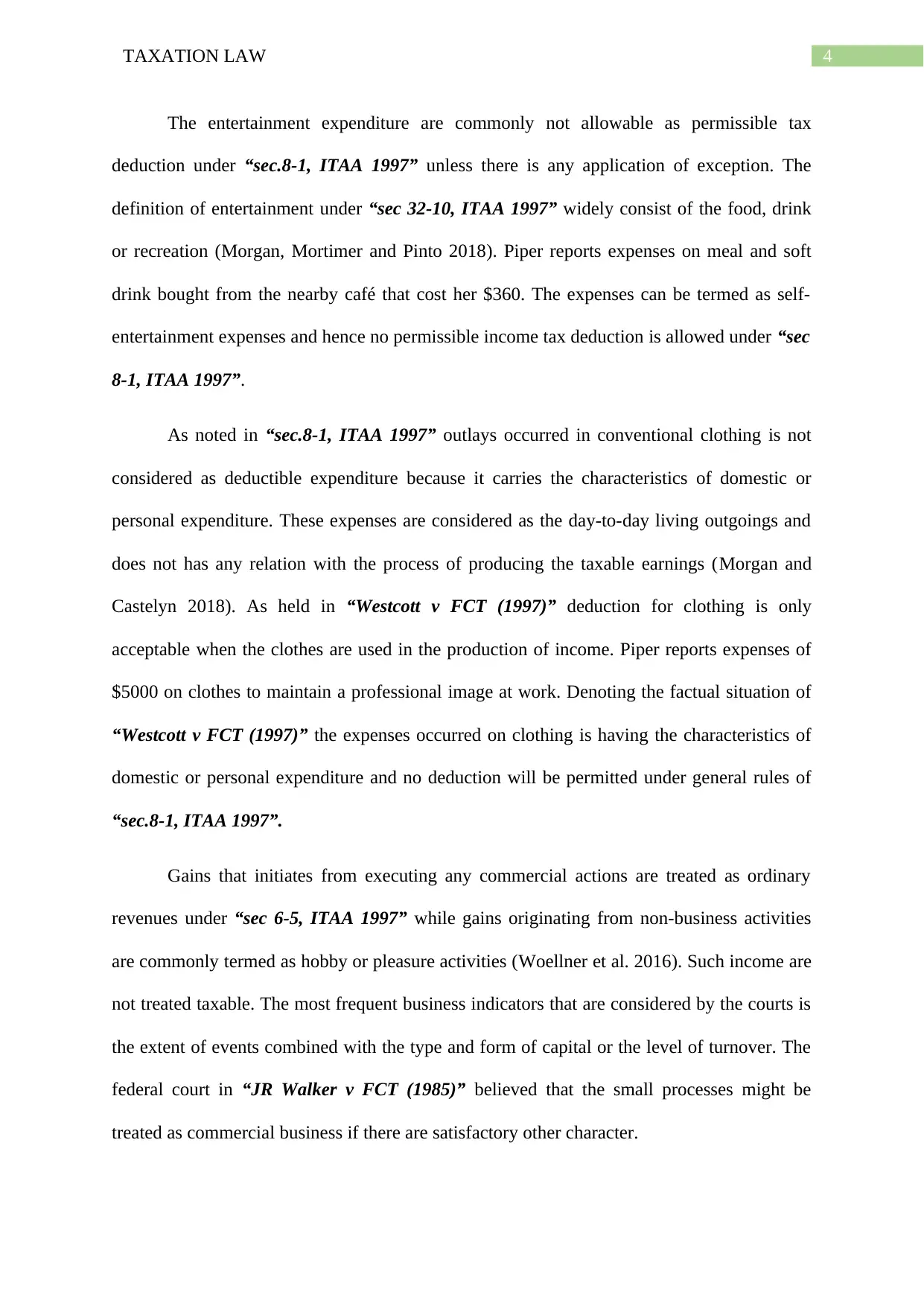
4TAXATION LAW
The entertainment expenditure are commonly not allowable as permissible tax
deduction under “sec.8-1, ITAA 1997” unless there is any application of exception. The
definition of entertainment under “sec 32-10, ITAA 1997” widely consist of the food, drink
or recreation (Morgan, Mortimer and Pinto 2018). Piper reports expenses on meal and soft
drink bought from the nearby café that cost her $360. The expenses can be termed as self-
entertainment expenses and hence no permissible income tax deduction is allowed under “sec
8-1, ITAA 1997”.
As noted in “sec.8-1, ITAA 1997” outlays occurred in conventional clothing is not
considered as deductible expenditure because it carries the characteristics of domestic or
personal expenditure. These expenses are considered as the day-to-day living outgoings and
does not has any relation with the process of producing the taxable earnings (Morgan and
Castelyn 2018). As held in “Westcott v FCT (1997)” deduction for clothing is only
acceptable when the clothes are used in the production of income. Piper reports expenses of
$5000 on clothes to maintain a professional image at work. Denoting the factual situation of
“Westcott v FCT (1997)” the expenses occurred on clothing is having the characteristics of
domestic or personal expenditure and no deduction will be permitted under general rules of
“sec.8-1, ITAA 1997”.
Gains that initiates from executing any commercial actions are treated as ordinary
revenues under “sec 6-5, ITAA 1997” while gains originating from non-business activities
are commonly termed as hobby or pleasure activities (Woellner et al. 2016). Such income are
not treated taxable. The most frequent business indicators that are considered by the courts is
the extent of events combined with the type and form of capital or the level of turnover. The
federal court in “JR Walker v FCT (1985)” believed that the small processes might be
treated as commercial business if there are satisfactory other character.
The entertainment expenditure are commonly not allowable as permissible tax
deduction under “sec.8-1, ITAA 1997” unless there is any application of exception. The
definition of entertainment under “sec 32-10, ITAA 1997” widely consist of the food, drink
or recreation (Morgan, Mortimer and Pinto 2018). Piper reports expenses on meal and soft
drink bought from the nearby café that cost her $360. The expenses can be termed as self-
entertainment expenses and hence no permissible income tax deduction is allowed under “sec
8-1, ITAA 1997”.
As noted in “sec.8-1, ITAA 1997” outlays occurred in conventional clothing is not
considered as deductible expenditure because it carries the characteristics of domestic or
personal expenditure. These expenses are considered as the day-to-day living outgoings and
does not has any relation with the process of producing the taxable earnings (Morgan and
Castelyn 2018). As held in “Westcott v FCT (1997)” deduction for clothing is only
acceptable when the clothes are used in the production of income. Piper reports expenses of
$5000 on clothes to maintain a professional image at work. Denoting the factual situation of
“Westcott v FCT (1997)” the expenses occurred on clothing is having the characteristics of
domestic or personal expenditure and no deduction will be permitted under general rules of
“sec.8-1, ITAA 1997”.
Gains that initiates from executing any commercial actions are treated as ordinary
revenues under “sec 6-5, ITAA 1997” while gains originating from non-business activities
are commonly termed as hobby or pleasure activities (Woellner et al. 2016). Such income are
not treated taxable. The most frequent business indicators that are considered by the courts is
the extent of events combined with the type and form of capital or the level of turnover. The
federal court in “JR Walker v FCT (1985)” believed that the small processes might be
treated as commercial business if there are satisfactory other character.
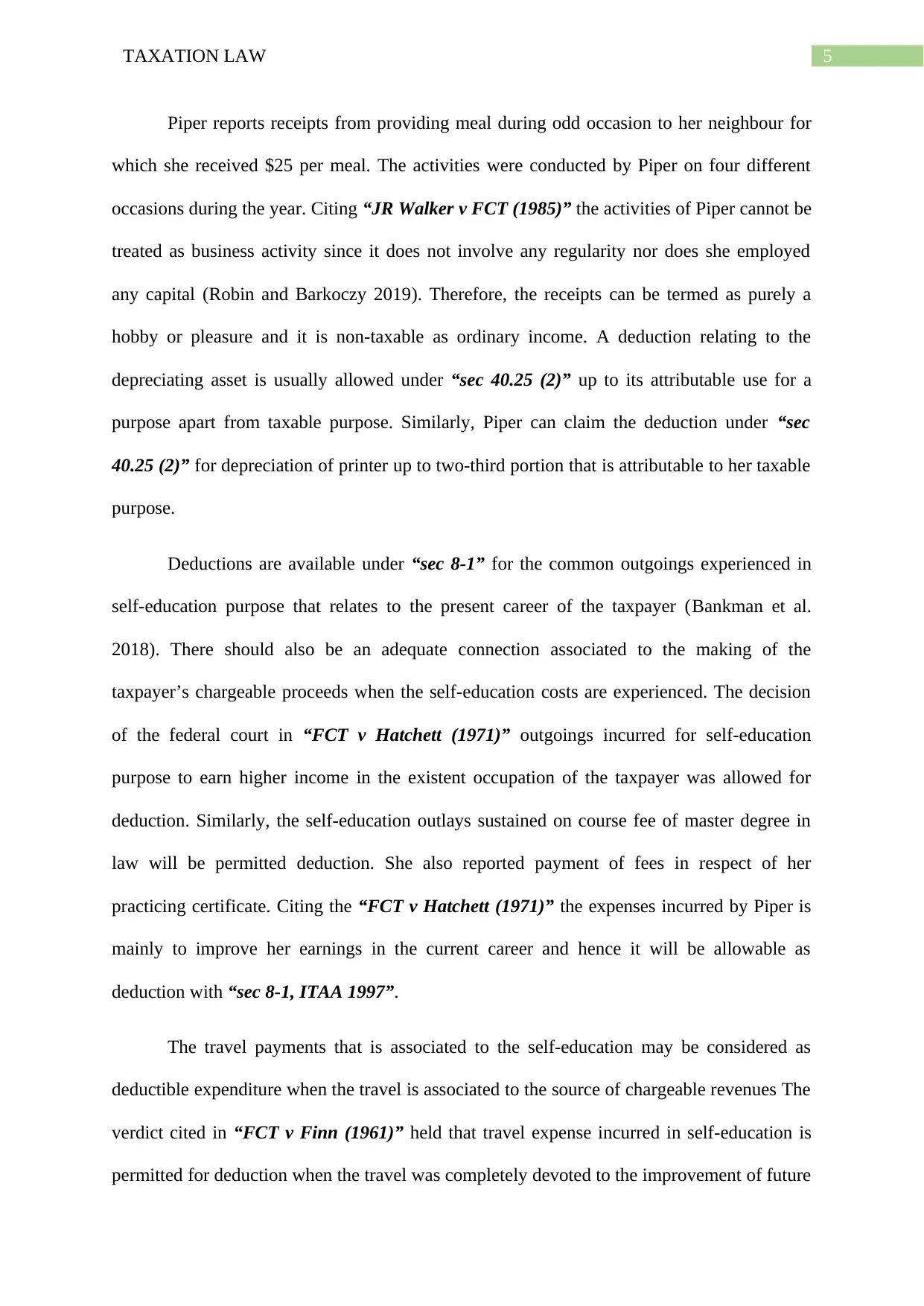
5TAXATION LAW
Piper reports receipts from providing meal during odd occasion to her neighbour for
which she received $25 per meal. The activities were conducted by Piper on four different
occasions during the year. Citing “JR Walker v FCT (1985)” the activities of Piper cannot be
treated as business activity since it does not involve any regularity nor does she employed
any capital (Robin and Barkoczy 2019). Therefore, the receipts can be termed as purely a
hobby or pleasure and it is non-taxable as ordinary income. A deduction relating to the
depreciating asset is usually allowed under “sec 40.25 (2)” up to its attributable use for a
purpose apart from taxable purpose. Similarly, Piper can claim the deduction under “sec
40.25 (2)” for depreciation of printer up to two-third portion that is attributable to her taxable
purpose.
Deductions are available under “sec 8-1” for the common outgoings experienced in
self-education purpose that relates to the present career of the taxpayer (Bankman et al.
2018). There should also be an adequate connection associated to the making of the
taxpayer’s chargeable proceeds when the self-education costs are experienced. The decision
of the federal court in “FCT v Hatchett (1971)” outgoings incurred for self-education
purpose to earn higher income in the existent occupation of the taxpayer was allowed for
deduction. Similarly, the self-education outlays sustained on course fee of master degree in
law will be permitted deduction. She also reported payment of fees in respect of her
practicing certificate. Citing the “FCT v Hatchett (1971)” the expenses incurred by Piper is
mainly to improve her earnings in the current career and hence it will be allowable as
deduction with “sec 8-1, ITAA 1997”.
The travel payments that is associated to the self-education may be considered as
deductible expenditure when the travel is associated to the source of chargeable revenues The
verdict cited in “FCT v Finn (1961)” held that travel expense incurred in self-education is
permitted for deduction when the travel was completely devoted to the improvement of future
Piper reports receipts from providing meal during odd occasion to her neighbour for
which she received $25 per meal. The activities were conducted by Piper on four different
occasions during the year. Citing “JR Walker v FCT (1985)” the activities of Piper cannot be
treated as business activity since it does not involve any regularity nor does she employed
any capital (Robin and Barkoczy 2019). Therefore, the receipts can be termed as purely a
hobby or pleasure and it is non-taxable as ordinary income. A deduction relating to the
depreciating asset is usually allowed under “sec 40.25 (2)” up to its attributable use for a
purpose apart from taxable purpose. Similarly, Piper can claim the deduction under “sec
40.25 (2)” for depreciation of printer up to two-third portion that is attributable to her taxable
purpose.
Deductions are available under “sec 8-1” for the common outgoings experienced in
self-education purpose that relates to the present career of the taxpayer (Bankman et al.
2018). There should also be an adequate connection associated to the making of the
taxpayer’s chargeable proceeds when the self-education costs are experienced. The decision
of the federal court in “FCT v Hatchett (1971)” outgoings incurred for self-education
purpose to earn higher income in the existent occupation of the taxpayer was allowed for
deduction. Similarly, the self-education outlays sustained on course fee of master degree in
law will be permitted deduction. She also reported payment of fees in respect of her
practicing certificate. Citing the “FCT v Hatchett (1971)” the expenses incurred by Piper is
mainly to improve her earnings in the current career and hence it will be allowable as
deduction with “sec 8-1, ITAA 1997”.
The travel payments that is associated to the self-education may be considered as
deductible expenditure when the travel is associated to the source of chargeable revenues The
verdict cited in “FCT v Finn (1961)” held that travel expense incurred in self-education is
permitted for deduction when the travel was completely devoted to the improvement of future
⊘ This is a preview!⊘
Do you want full access?
Subscribe today to unlock all pages.

Trusted by 1+ million students worldwide
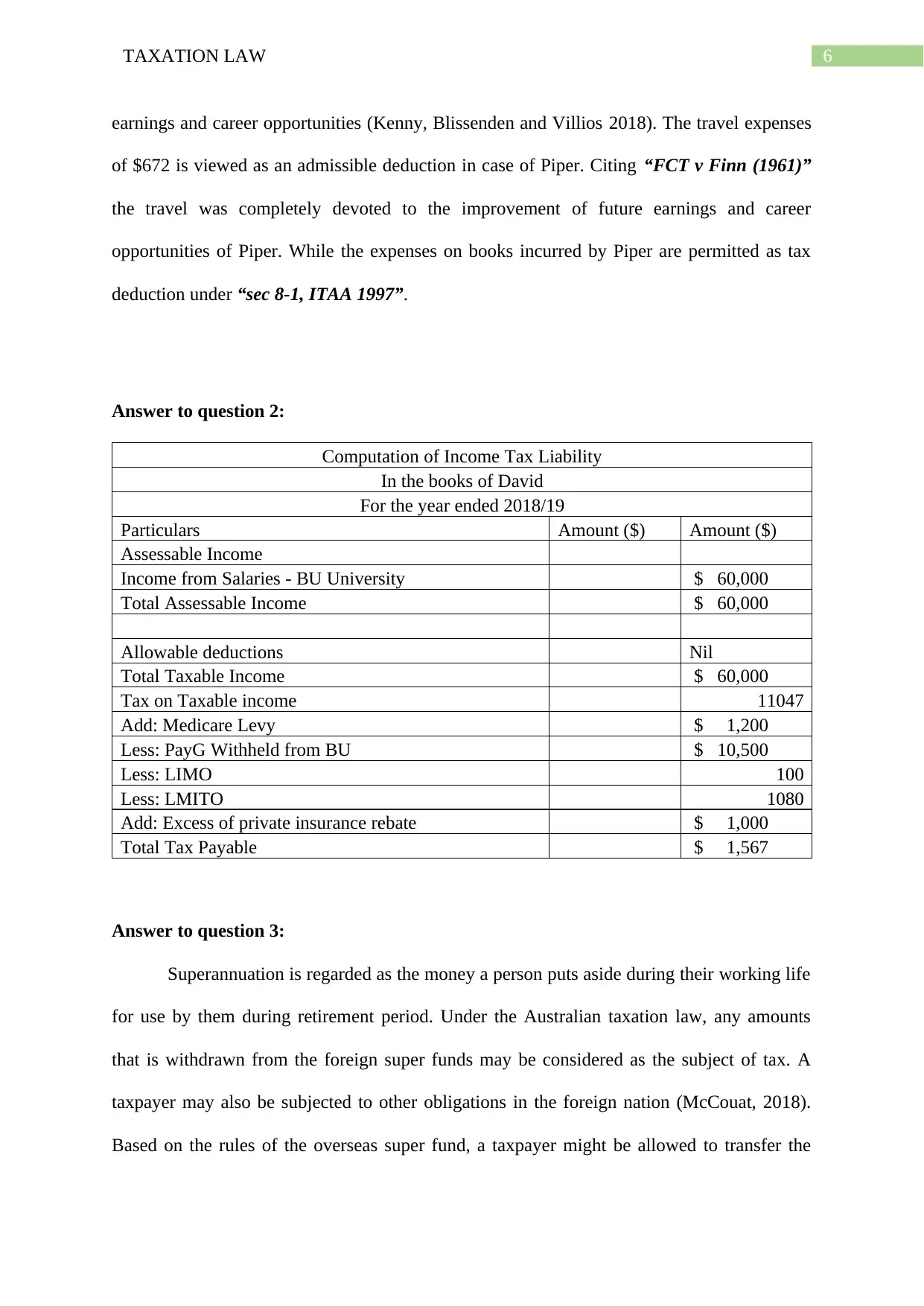
6TAXATION LAW
earnings and career opportunities (Kenny, Blissenden and Villios 2018). The travel expenses
of $672 is viewed as an admissible deduction in case of Piper. Citing “FCT v Finn (1961)”
the travel was completely devoted to the improvement of future earnings and career
opportunities of Piper. While the expenses on books incurred by Piper are permitted as tax
deduction under “sec 8-1, ITAA 1997”.
Answer to question 2:
Computation of Income Tax Liability
In the books of David
For the year ended 2018/19
Particulars Amount ($) Amount ($)
Assessable Income
Income from Salaries - BU University $ 60,000
Total Assessable Income $ 60,000
Allowable deductions Nil
Total Taxable Income $ 60,000
Tax on Taxable income 11047
Add: Medicare Levy $ 1,200
Less: PayG Withheld from BU $ 10,500
Less: LIMO 100
Less: LMITO 1080
Add: Excess of private insurance rebate $ 1,000
Total Tax Payable $ 1,567
Answer to question 3:
Superannuation is regarded as the money a person puts aside during their working life
for use by them during retirement period. Under the Australian taxation law, any amounts
that is withdrawn from the foreign super funds may be considered as the subject of tax. A
taxpayer may also be subjected to other obligations in the foreign nation (McCouat, 2018).
Based on the rules of the overseas super fund, a taxpayer might be allowed to transfer the
earnings and career opportunities (Kenny, Blissenden and Villios 2018). The travel expenses
of $672 is viewed as an admissible deduction in case of Piper. Citing “FCT v Finn (1961)”
the travel was completely devoted to the improvement of future earnings and career
opportunities of Piper. While the expenses on books incurred by Piper are permitted as tax
deduction under “sec 8-1, ITAA 1997”.
Answer to question 2:
Computation of Income Tax Liability
In the books of David
For the year ended 2018/19
Particulars Amount ($) Amount ($)
Assessable Income
Income from Salaries - BU University $ 60,000
Total Assessable Income $ 60,000
Allowable deductions Nil
Total Taxable Income $ 60,000
Tax on Taxable income 11047
Add: Medicare Levy $ 1,200
Less: PayG Withheld from BU $ 10,500
Less: LIMO 100
Less: LMITO 1080
Add: Excess of private insurance rebate $ 1,000
Total Tax Payable $ 1,567
Answer to question 3:
Superannuation is regarded as the money a person puts aside during their working life
for use by them during retirement period. Under the Australian taxation law, any amounts
that is withdrawn from the foreign super funds may be considered as the subject of tax. A
taxpayer may also be subjected to other obligations in the foreign nation (McCouat, 2018).
Based on the rules of the overseas super fund, a taxpayer might be allowed to transfer the
Paraphrase This Document
Need a fresh take? Get an instant paraphrase of this document with our AI Paraphraser
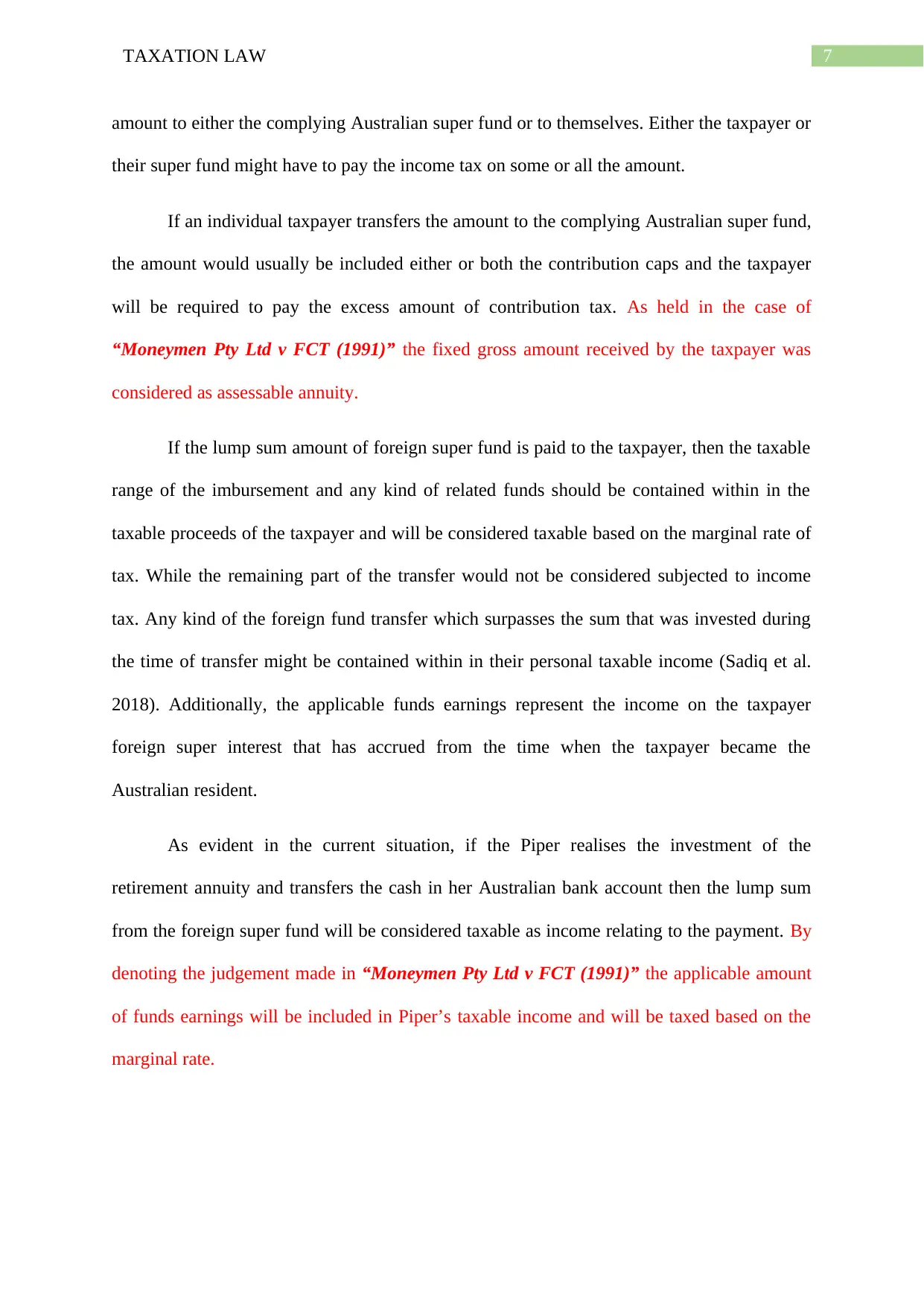
7TAXATION LAW
amount to either the complying Australian super fund or to themselves. Either the taxpayer or
their super fund might have to pay the income tax on some or all the amount.
If an individual taxpayer transfers the amount to the complying Australian super fund,
the amount would usually be included either or both the contribution caps and the taxpayer
will be required to pay the excess amount of contribution tax. As held in the case of
“Moneymen Pty Ltd v FCT (1991)” the fixed gross amount received by the taxpayer was
considered as assessable annuity.
If the lump sum amount of foreign super fund is paid to the taxpayer, then the taxable
range of the imbursement and any kind of related funds should be contained within in the
taxable proceeds of the taxpayer and will be considered taxable based on the marginal rate of
tax. While the remaining part of the transfer would not be considered subjected to income
tax. Any kind of the foreign fund transfer which surpasses the sum that was invested during
the time of transfer might be contained within in their personal taxable income (Sadiq et al.
2018). Additionally, the applicable funds earnings represent the income on the taxpayer
foreign super interest that has accrued from the time when the taxpayer became the
Australian resident.
As evident in the current situation, if the Piper realises the investment of the
retirement annuity and transfers the cash in her Australian bank account then the lump sum
from the foreign super fund will be considered taxable as income relating to the payment. By
denoting the judgement made in “Moneymen Pty Ltd v FCT (1991)” the applicable amount
of funds earnings will be included in Piper’s taxable income and will be taxed based on the
marginal rate.
amount to either the complying Australian super fund or to themselves. Either the taxpayer or
their super fund might have to pay the income tax on some or all the amount.
If an individual taxpayer transfers the amount to the complying Australian super fund,
the amount would usually be included either or both the contribution caps and the taxpayer
will be required to pay the excess amount of contribution tax. As held in the case of
“Moneymen Pty Ltd v FCT (1991)” the fixed gross amount received by the taxpayer was
considered as assessable annuity.
If the lump sum amount of foreign super fund is paid to the taxpayer, then the taxable
range of the imbursement and any kind of related funds should be contained within in the
taxable proceeds of the taxpayer and will be considered taxable based on the marginal rate of
tax. While the remaining part of the transfer would not be considered subjected to income
tax. Any kind of the foreign fund transfer which surpasses the sum that was invested during
the time of transfer might be contained within in their personal taxable income (Sadiq et al.
2018). Additionally, the applicable funds earnings represent the income on the taxpayer
foreign super interest that has accrued from the time when the taxpayer became the
Australian resident.
As evident in the current situation, if the Piper realises the investment of the
retirement annuity and transfers the cash in her Australian bank account then the lump sum
from the foreign super fund will be considered taxable as income relating to the payment. By
denoting the judgement made in “Moneymen Pty Ltd v FCT (1991)” the applicable amount
of funds earnings will be included in Piper’s taxable income and will be taxed based on the
marginal rate.
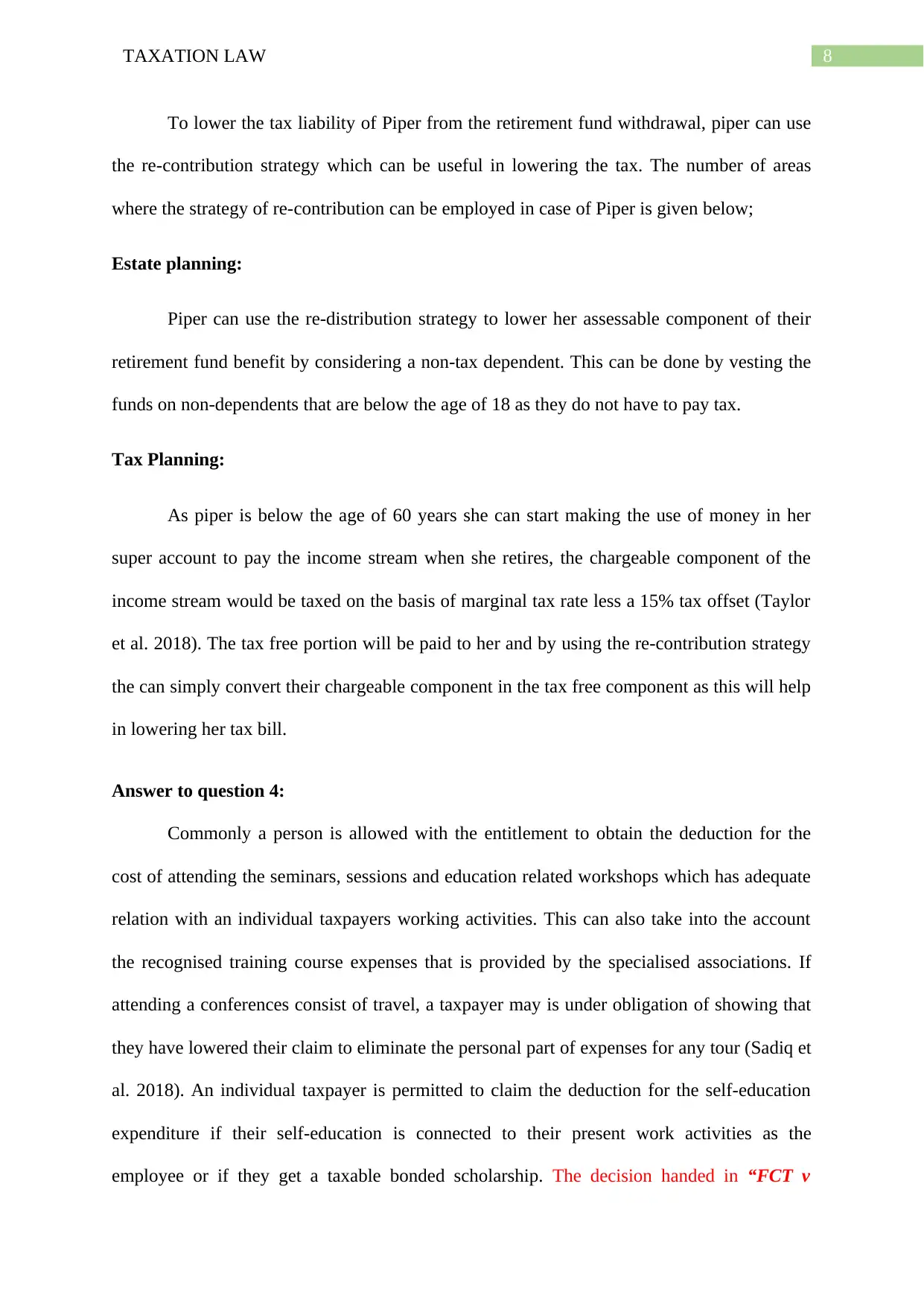
8TAXATION LAW
To lower the tax liability of Piper from the retirement fund withdrawal, piper can use
the re-contribution strategy which can be useful in lowering the tax. The number of areas
where the strategy of re-contribution can be employed in case of Piper is given below;
Estate planning:
Piper can use the re-distribution strategy to lower her assessable component of their
retirement fund benefit by considering a non-tax dependent. This can be done by vesting the
funds on non-dependents that are below the age of 18 as they do not have to pay tax.
Tax Planning:
As piper is below the age of 60 years she can start making the use of money in her
super account to pay the income stream when she retires, the chargeable component of the
income stream would be taxed on the basis of marginal tax rate less a 15% tax offset (Taylor
et al. 2018). The tax free portion will be paid to her and by using the re-contribution strategy
the can simply convert their chargeable component in the tax free component as this will help
in lowering her tax bill.
Answer to question 4:
Commonly a person is allowed with the entitlement to obtain the deduction for the
cost of attending the seminars, sessions and education related workshops which has adequate
relation with an individual taxpayers working activities. This can also take into the account
the recognised training course expenses that is provided by the specialised associations. If
attending a conferences consist of travel, a taxpayer may is under obligation of showing that
they have lowered their claim to eliminate the personal part of expenses for any tour (Sadiq et
al. 2018). An individual taxpayer is permitted to claim the deduction for the self-education
expenditure if their self-education is connected to their present work activities as the
employee or if they get a taxable bonded scholarship. The decision handed in “FCT v
To lower the tax liability of Piper from the retirement fund withdrawal, piper can use
the re-contribution strategy which can be useful in lowering the tax. The number of areas
where the strategy of re-contribution can be employed in case of Piper is given below;
Estate planning:
Piper can use the re-distribution strategy to lower her assessable component of their
retirement fund benefit by considering a non-tax dependent. This can be done by vesting the
funds on non-dependents that are below the age of 18 as they do not have to pay tax.
Tax Planning:
As piper is below the age of 60 years she can start making the use of money in her
super account to pay the income stream when she retires, the chargeable component of the
income stream would be taxed on the basis of marginal tax rate less a 15% tax offset (Taylor
et al. 2018). The tax free portion will be paid to her and by using the re-contribution strategy
the can simply convert their chargeable component in the tax free component as this will help
in lowering her tax bill.
Answer to question 4:
Commonly a person is allowed with the entitlement to obtain the deduction for the
cost of attending the seminars, sessions and education related workshops which has adequate
relation with an individual taxpayers working activities. This can also take into the account
the recognised training course expenses that is provided by the specialised associations. If
attending a conferences consist of travel, a taxpayer may is under obligation of showing that
they have lowered their claim to eliminate the personal part of expenses for any tour (Sadiq et
al. 2018). An individual taxpayer is permitted to claim the deduction for the self-education
expenditure if their self-education is connected to their present work activities as the
employee or if they get a taxable bonded scholarship. The decision handed in “FCT v
⊘ This is a preview!⊘
Do you want full access?
Subscribe today to unlock all pages.

Trusted by 1+ million students worldwide
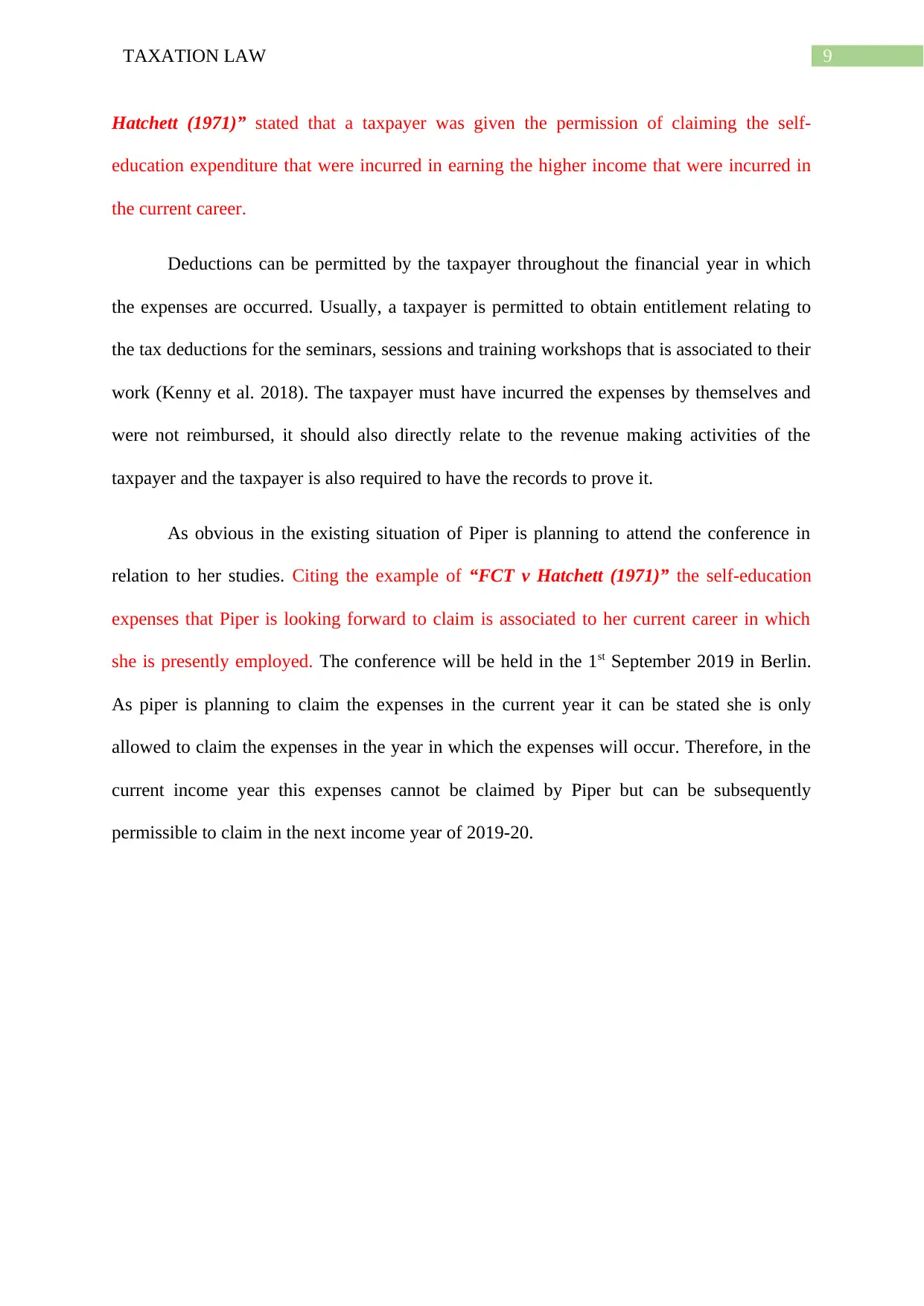
9TAXATION LAW
Hatchett (1971)” stated that a taxpayer was given the permission of claiming the self-
education expenditure that were incurred in earning the higher income that were incurred in
the current career.
Deductions can be permitted by the taxpayer throughout the financial year in which
the expenses are occurred. Usually, a taxpayer is permitted to obtain entitlement relating to
the tax deductions for the seminars, sessions and training workshops that is associated to their
work (Kenny et al. 2018). The taxpayer must have incurred the expenses by themselves and
were not reimbursed, it should also directly relate to the revenue making activities of the
taxpayer and the taxpayer is also required to have the records to prove it.
As obvious in the existing situation of Piper is planning to attend the conference in
relation to her studies. Citing the example of “FCT v Hatchett (1971)” the self-education
expenses that Piper is looking forward to claim is associated to her current career in which
she is presently employed. The conference will be held in the 1st September 2019 in Berlin.
As piper is planning to claim the expenses in the current year it can be stated she is only
allowed to claim the expenses in the year in which the expenses will occur. Therefore, in the
current income year this expenses cannot be claimed by Piper but can be subsequently
permissible to claim in the next income year of 2019-20.
Hatchett (1971)” stated that a taxpayer was given the permission of claiming the self-
education expenditure that were incurred in earning the higher income that were incurred in
the current career.
Deductions can be permitted by the taxpayer throughout the financial year in which
the expenses are occurred. Usually, a taxpayer is permitted to obtain entitlement relating to
the tax deductions for the seminars, sessions and training workshops that is associated to their
work (Kenny et al. 2018). The taxpayer must have incurred the expenses by themselves and
were not reimbursed, it should also directly relate to the revenue making activities of the
taxpayer and the taxpayer is also required to have the records to prove it.
As obvious in the existing situation of Piper is planning to attend the conference in
relation to her studies. Citing the example of “FCT v Hatchett (1971)” the self-education
expenses that Piper is looking forward to claim is associated to her current career in which
she is presently employed. The conference will be held in the 1st September 2019 in Berlin.
As piper is planning to claim the expenses in the current year it can be stated she is only
allowed to claim the expenses in the year in which the expenses will occur. Therefore, in the
current income year this expenses cannot be claimed by Piper but can be subsequently
permissible to claim in the next income year of 2019-20.
Paraphrase This Document
Need a fresh take? Get an instant paraphrase of this document with our AI Paraphraser
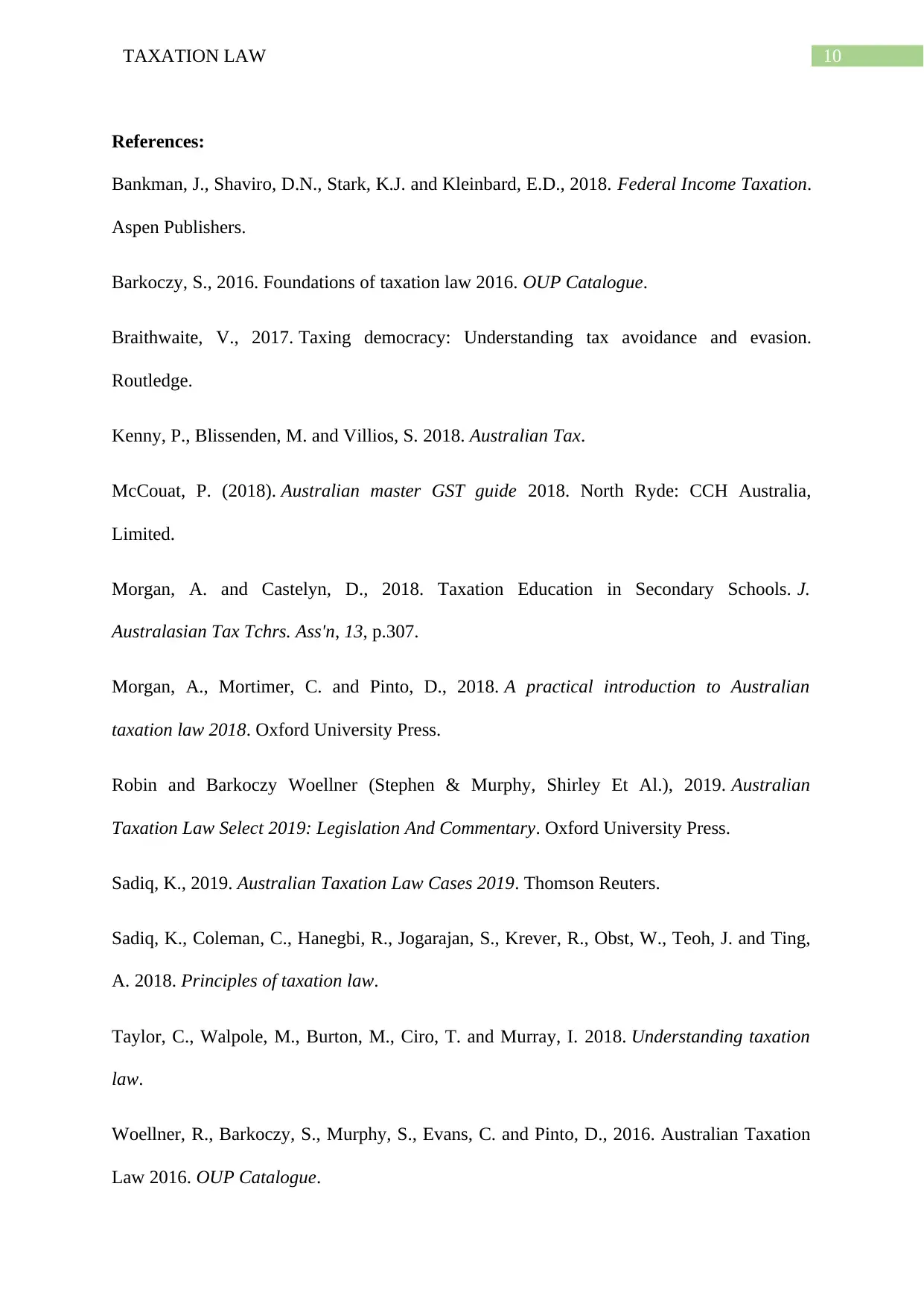
10TAXATION LAW
References:
Bankman, J., Shaviro, D.N., Stark, K.J. and Kleinbard, E.D., 2018. Federal Income Taxation.
Aspen Publishers.
Barkoczy, S., 2016. Foundations of taxation law 2016. OUP Catalogue.
Braithwaite, V., 2017. Taxing democracy: Understanding tax avoidance and evasion.
Routledge.
Kenny, P., Blissenden, M. and Villios, S. 2018. Australian Tax.
McCouat, P. (2018). Australian master GST guide 2018. North Ryde: CCH Australia,
Limited.
Morgan, A. and Castelyn, D., 2018. Taxation Education in Secondary Schools. J.
Australasian Tax Tchrs. Ass'n, 13, p.307.
Morgan, A., Mortimer, C. and Pinto, D., 2018. A practical introduction to Australian
taxation law 2018. Oxford University Press.
Robin and Barkoczy Woellner (Stephen & Murphy, Shirley Et Al.), 2019. Australian
Taxation Law Select 2019: Legislation And Commentary. Oxford University Press.
Sadiq, K., 2019. Australian Taxation Law Cases 2019. Thomson Reuters.
Sadiq, K., Coleman, C., Hanegbi, R., Jogarajan, S., Krever, R., Obst, W., Teoh, J. and Ting,
A. 2018. Principles of taxation law.
Taylor, C., Walpole, M., Burton, M., Ciro, T. and Murray, I. 2018. Understanding taxation
law.
Woellner, R., Barkoczy, S., Murphy, S., Evans, C. and Pinto, D., 2016. Australian Taxation
Law 2016. OUP Catalogue.
References:
Bankman, J., Shaviro, D.N., Stark, K.J. and Kleinbard, E.D., 2018. Federal Income Taxation.
Aspen Publishers.
Barkoczy, S., 2016. Foundations of taxation law 2016. OUP Catalogue.
Braithwaite, V., 2017. Taxing democracy: Understanding tax avoidance and evasion.
Routledge.
Kenny, P., Blissenden, M. and Villios, S. 2018. Australian Tax.
McCouat, P. (2018). Australian master GST guide 2018. North Ryde: CCH Australia,
Limited.
Morgan, A. and Castelyn, D., 2018. Taxation Education in Secondary Schools. J.
Australasian Tax Tchrs. Ass'n, 13, p.307.
Morgan, A., Mortimer, C. and Pinto, D., 2018. A practical introduction to Australian
taxation law 2018. Oxford University Press.
Robin and Barkoczy Woellner (Stephen & Murphy, Shirley Et Al.), 2019. Australian
Taxation Law Select 2019: Legislation And Commentary. Oxford University Press.
Sadiq, K., 2019. Australian Taxation Law Cases 2019. Thomson Reuters.
Sadiq, K., Coleman, C., Hanegbi, R., Jogarajan, S., Krever, R., Obst, W., Teoh, J. and Ting,
A. 2018. Principles of taxation law.
Taylor, C., Walpole, M., Burton, M., Ciro, T. and Murray, I. 2018. Understanding taxation
law.
Woellner, R., Barkoczy, S., Murphy, S., Evans, C. and Pinto, D., 2016. Australian Taxation
Law 2016. OUP Catalogue.
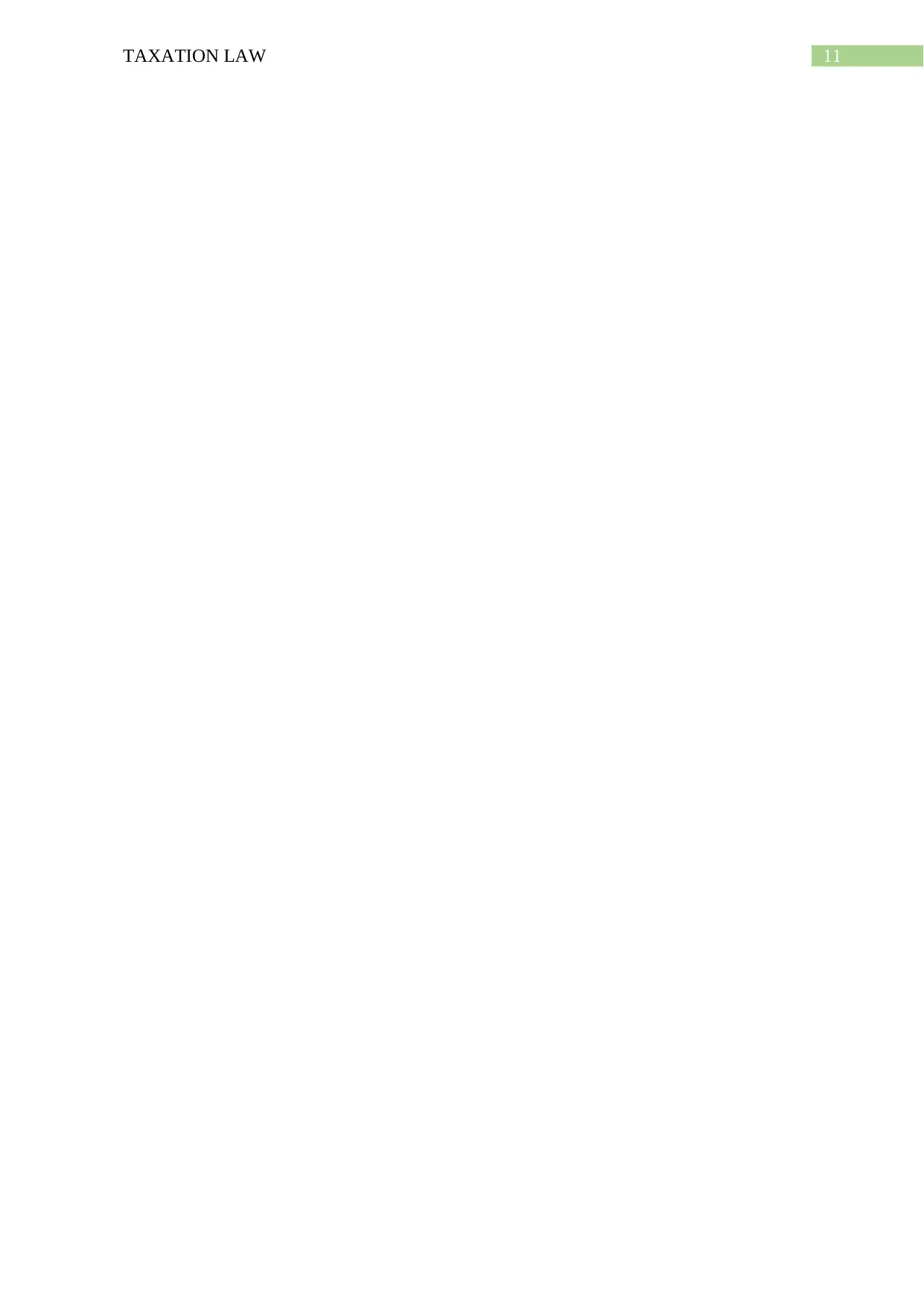
11TAXATION LAW
⊘ This is a preview!⊘
Do you want full access?
Subscribe today to unlock all pages.

Trusted by 1+ million students worldwide
1 out of 12
Related Documents
Your All-in-One AI-Powered Toolkit for Academic Success.
+13062052269
info@desklib.com
Available 24*7 on WhatsApp / Email
![[object Object]](/_next/static/media/star-bottom.7253800d.svg)
Unlock your academic potential
Copyright © 2020–2026 A2Z Services. All Rights Reserved. Developed and managed by ZUCOL.





